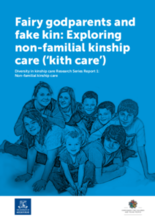Executive Summary
Kinship care – the care of children by relatives or family friends – is a relatively new option for children subject to protective orders. Both changing ideology and a shortage of alternative placements have led to numbers in kinship care in Victoria rapidly increasing year on year. The growing research literature focuses particularly on grandparents as the most visible cohort of kinship carers. Little attention has been paid to care by family friends (non-familial kinship care) – a gap that this research study sought to address. A search was conducted for relevant administrative data that might provide information about the prevalence and stability of non-familial kinship care. It was determined that the prevalence of non-familial kinship care arrangements is as yet unknown, both within Victoria and across Australia.
The experiences of young people, carers and kinship care support workers were explored through interviews, focus groups and a small survey. Carers and support staff provided many examples of secure long-term non-familial care and evident benefits for children, despite significant unmet needs for support. On the other hand, kinship support staff also described numbers of unsatisfactory care arrangements, and some that were frankly unsuitable. Several areas of problematic practice were evident. Many cases were described where statutory care arrangements had been struck with people who had little or no relationship with children, yet were deemed to be kinship care placements. Superficial and delayed assessments were reportedly common. Care was seen to have frequently commenced as an emergency short-term arrangement but allowed to drift to indefinite care or breakdown without due consideration of the needs of children and carers. Many arrangements were observed to have broken down quickly. Paradoxically, there also were indications that the stability planning process could threaten a stable long-term care arrangement by initiating a further search for extended family care years later, whether or not relatives under consideration had a significant relationship with the child.
A number of discrepancies in standards and support between kinship care and foster care were raised. Carers spoke of delays in being referred for support; a lack of access to information about children’s backgrounds; care allowances that failed to recognise children’s additional needs; and limited access to training about the impact of trauma. Many carers were aware that their entitlements for financial and non-financial support would have been considerably greater had they been authorised as foster carers.
In earlier years, statutory non-familial carers were regarded as (specific) foster carers, and were afforded thorough assessment and ongoing support, with all placements receiving active support and management. Less than onefifth of children in statutory kinship care in Victoria currently receive case management and carer supervision and support from community organisations; due to high child protection workloads, many have become ‘unallocated cases’ within the child protection service. It should go without saying that all children in statutory care need the protection of robust carer assessment and support, and active case planning and management.
The results of this study suggest that some non-familial kinship care represents an unofficial redefinition of potential foster carers as kinship carers, with resulting neglect of the proper assessment and management of children’s care. An acute lack of placement alternatives, and a lack of capacity to undertake thorough and timely caregiver assessments, combine to provide fertile ground for inadequate and potentially abusive care. Such arrangements cannot meet minimum standards for the protection of vulnerable children. There is a need to rethink the notion of so-called ‘kith care’ or non-familial kinship care, and to acknowledge that carers with little pre-existing relationship to children are providing foster care rather than kinship care, and should be managed as such. To reinstate the practice of specific foster care assessments in these circumstances would, however, necessitate generating an increased range of options for emergency care to allow time for thorough pre-care assessment.
Kinship care, whether by family or ‘family friends’, is not a panacea for protective care. However with proper assessment, financial and non-financial support, it has proved to be an excellent option for many children in need, and rightly the placement of choice.

